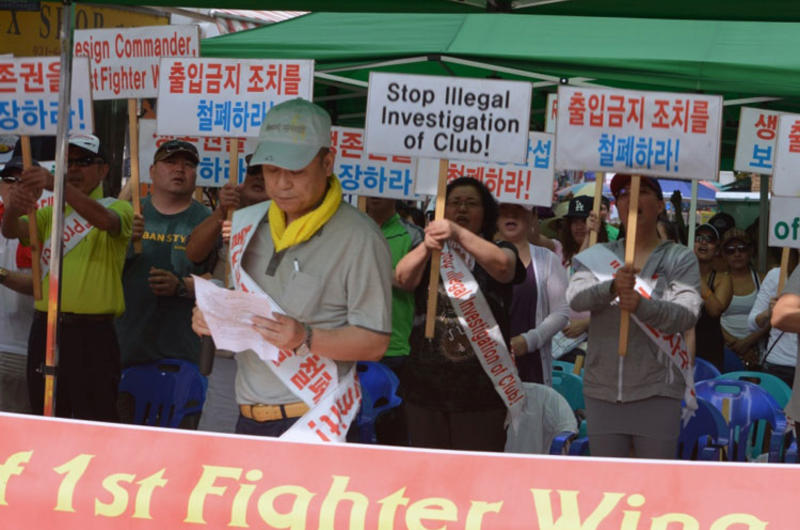Osan eases ban on shopping district due to effect on businesses

Bar owners and workers outside Osan Air Base hold a protest June 19, 2013, against the recent off-limits restrictions that were imposed on several bars last week. (ARMANDO R. LIMON/STARS AND STRIPES)
By JON RABIROFF AND YOO KYONG CHANG | Stars and Stripes June 19, 2013
OSAN AIR BASE, South Korea — Osan Air Base has cut two hours off the time that the adjacent shopping area is off-limits each day, aware that hundreds of business are suffering due to a standoff between the U.S. military and “juicy bars” over prostitution concerns.
Servicemembers still are barred from the area, which is home to more than 500 businesses, from 1 p.m. to 1 a.m., when the nightly curfew kicks in until 5 a.m. The ban began last Friday, when juicy bar owners, their employees and other supporters began daily protests outside the Osan gates over the base’s decision to add six bars to the off-limits list, raising the total to 12.
Pushing back the start of the off-limits designation from 11 a.m. “will allow personnel more time in the Songtan Entertainment District to shop, eat lunch and support local merchants, with the goal of maintaining good relations with our community partners,” 51st Fighter Wing Capt. Adam Gregory said.
“We understand how much this restriction is affecting the business owners and hope that there can be some sort of resolution soon,” he added.
The local chamber of commerce claims a number of businesses have been caught in the middle. They already have held one counter-protest and are planning another for Friday or Saturday.
“If the problem is not solved quickly, all the merchants’ anger is going to reach the boiling point and they may move their businesses,” Songtan Chamber of Commerce President Park Chu Sop said.
Businesses in the Osan Air Base area were already hurting, he said, and “if this situation continues … more businesses are going to close.”
Kim Tong-min, head of the Songtan branch of the Korea Foreigner Tourist Facility Association – which represents about 150 U.S. military base-area juicy bars across the peninsula – said his members plan to continue their daily protests because of what they call heavy-handed tactics in regulating the clubs.
Base-area juicy bars primarily employ Philippine women who are brought into South Korea to serve as hostesses. Their job is to flirt with servicemembers, trying to get them to buy the women expensive juice drinks in exchange for their continued company and conversation.
While flirting is as far as things go at some of the bars, others are notorious for forcing their “juicy girls” to prostitute themselves when they fall short of drink-sale quotas.
USFK blacklists juicy bars caught in the act of promoting prostitution and human trafficking, but servicemen can patronize others even though the command states: “Buying overpriced drinks in a juicy bar supports the human trafficking industry, a form of modern-day slavery.”
While conceding a small minority of juicy bar owners might engage in promoting prostitution, association officials say the vast majority operate properly.



